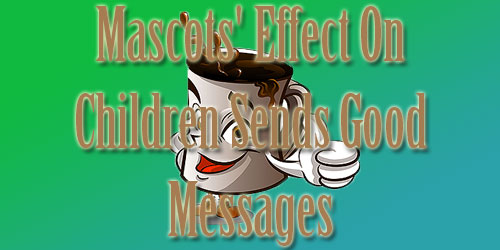 02 Jan 19
02 Jan 19
Mascots' Effect On Children Sends Good Messages
Children and Mascot Mental Images
Mascots hold a solid mental image for most people that come in touch with one. But mascots impact on children is a lot stronger and serious than with any age group. Children often behave with fondness to mascots that display positive characteristics. A child may be delighted by the way a mascot dances or any humorous physical activity the mascot engages in. This is also true if a mascot is the embodiment of something that a youngster wants his or her parents to get for them. Mother and father are often vulnerable to the marketing business. This is true since many products such as toys and games, games, and food items are purchased by parents on behalf of their children. Young children may be very persistent in ensuring that their parents purchase the latest cereal or gadget because a mascot said it was great. In addition, children that are not but literate may really gravitate towards a mascot. Children at this stage of development search for pics or symbols that symbolize familiar what to them.
Mascots as Strong Symbols
Children will be the most sensitive of all age groups to mascots and their symbology. An adult may be able to discern in case a product or impression a mascot is certainly portraying is definitely worthless, while a kid may see something very different. Before language abilities are strongly developed, children have a tendency to remember events and people in snapshots like pictures in their recollections. 3d Mascot Design Company might be able to grab a location in a child's mind that'll be vivid and keep meaning into adulthood for the child.
Good Vibrations
The positive thoughts that mascots elicit from young children are often connected with just what a mascot does and not simply something itself. In the case of sporting groups the mascots impact on children may be to excite or enthuse them about the team or a game occurring. Not forgetting once again, youngsters may be drawn to the mascot on a personal level. Instead of wanting something lauded by way of a mascot, children may want something that signifies the mascot like a: stuffed dog, shirt, pennant flag, or pin. Mascots in of themselves can be easily sold to children to market team sales. Also, the mascot may motivate a new technology of fans to be realized with the team.
Mascots, Universities, and Self-Image
Elementary schools up to school campuses heavily apply mascots to mention team picture and assist in promoting team spirit. Mascots impact on children may be very strong when coping with school mascots. Young children face the image usually on a regular basis. The institution mascot could be present around the schools' outside sign or in the wall or ground of the fitness center. Also, children who play activities may wear uniforms that have the mascots proudly set upon them. Children may come to view themselves as getting many of the same characteristics because the mascot if they participate in crew sports. For this reason mascots that market a positive image are very important for school aged young children. Negative mascots effect on children may promote negative pictures of the school or perhaps even have an effect on a child's self-image.
Responsible Making of Mascots
Since mascots effect on children is profoundly profound adults have a very responsibility to generate mascots that send out a warm and constructive message. They have to keep the ideal interest of young children in mind when making the costume with the mascot. Also, the actions of this 3d Mascot Design Agency have become important. The individual portraying the mascot comes with an obligation to act enjoyment and upbeat, without engaging in any behavior that could have a negative or harmful connotation. This can only help to paint the staff or merchandise in a positive light with not only children, but people as well.


Comments